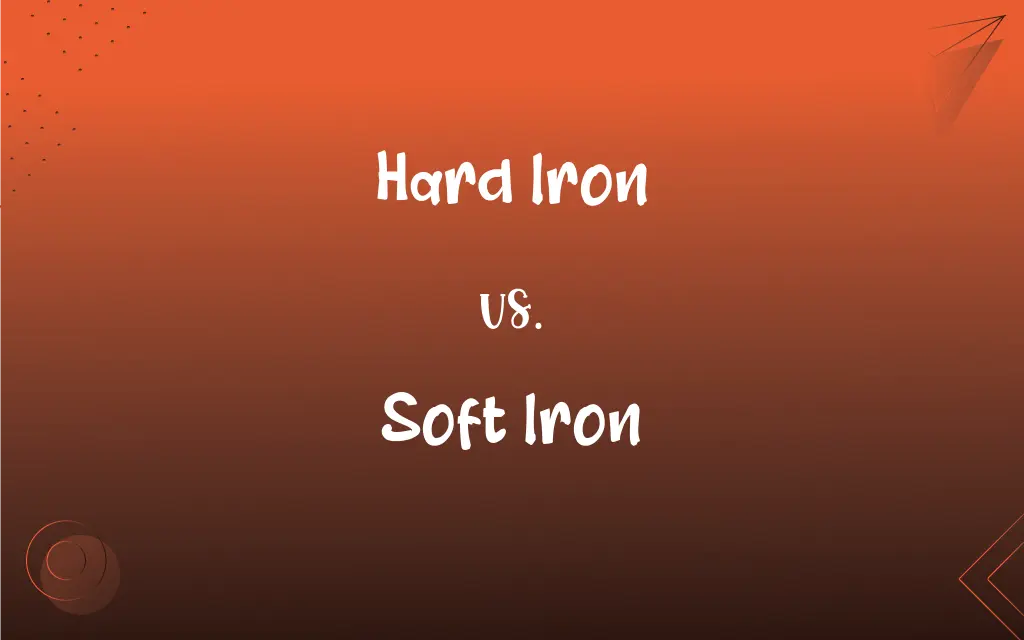Hard Iron vs. Soft Iron: What's the Difference?
Edited by Janet White || By Harlon Moss || Updated on October 16, 2023
Hard iron retains its magnetism permanently, while soft iron loses its magnetism quickly when the magnetizing force is removed.

Key Differences
Hard iron and soft iron are terms used to describe two types of iron based on their magnetic properties. Hard iron, also known as permanent magnet iron, becomes magnetized and retains this magnetization for a long duration. In contrast, soft iron gets magnetized quickly but also demagnetizes rapidly when the external magnetic field is removed.
In applications requiring permanent magnets, hard iron is the preferred choice. Its ability to sustain its magnetism over time makes it suitable for devices like compass needles. Soft iron, on the other hand, is used in scenarios where temporary magnetism is beneficial. This includes core materials in electromagnets or transformers, where magnetism needs to be switched on and off.
When it comes to the domain structure, the domains in hard iron do not revert back to their random alignment easily after magnetization. This property allows hard iron to preserve its magnetic nature. Soft iron, however, has domains that realign swiftly when the magnetizing influence is withdrawn, causing it to lose its magnetism.
The hysteresis loss, or the energy lost in the form of heat during magnetization and demagnetization, is significantly higher in hard iron. This is due to the difficulty in realigning the magnetic domains. In soft iron, the hysteresis loss is minimal since the domains reorient themselves effortlessly.
While both hard iron and soft iron serve critical roles in various applications, the choice between them boils down to the specific requirements of a project. Whether one requires a lasting magnetic effect or a transient one dictates the utilization of hard iron or soft iron.
ADVERTISEMENT
Comparison Chart
Retention of Magnetism
Retains magnetism permanently
Loses magnetism quickly
Usage
Permanent magnets, compass needles
Electromagnets, transformer cores
Domain Structure
Domains resist realignment
Domains realign swiftly
Hysteresis Loss
High
Low
Application Requirement
Suitable for long-lasting magnetism
Suitable for temporary magnetism
ADVERTISEMENT
Hard Iron and Soft Iron Definitions
Hard Iron
Often used in permanent magnets.
Hard iron magnets can stay magnetized for years.
Soft Iron
Exhibits negligible remanence post-magnetization.
Soft iron almost completely demagnetizes once the external field is removed.
Hard Iron
Iron that maintains its magnetism over time.
Compass needles are typically made of hard iron.
Soft Iron
Commonly used in electromagnets.
When you need temporary magnetism, soft iron is the go-to material.
Hard Iron
Material with high hysteresis loss.
Hard iron isn't ideal for alternating magnetic fields because of its energy loss.
Soft Iron
Iron that magnetizes and demagnetizes rapidly.
Soft iron cores enhance the efficiency of transformers.
Hard Iron
Iron resistant to domain realignment.
Magnetic domains in hard iron remain stable.
Soft Iron
Material with minimal hysteresis loss.
Soft iron is preferred in devices subjected to varying magnetic fields.
Hard Iron
Exhibits strong remanence after magnetization.
Once magnetized, hard iron can retain a significant portion of its magnetism.
Soft Iron
Iron whose magnetic domains realign easily.
Magnetic domains in soft iron adapt quickly to external influences.
FAQs
Is soft iron good for making permanent magnets?
No, because it loses its magnetism rapidly.
Does hard iron retain its magnetism indefinitely?
While not indefinitely, hard iron retains its magnetism for a long duration.
Can hard iron be demagnetized?
Yes, but it's more resistant to demagnetization than soft iron.
Are compass needles made of soft iron?
No, they are typically made of hard iron to retain their magnetism.
Why does hard iron have a high hysteresis loss?
Due to the resistance in realigning its magnetic domains.
What happens to the domains in soft iron when magnetized?
They realign quickly but revert back when the magnetic field is removed.
Is hard iron naturally occurring?
No, its properties are a result of specific alloying or treatment processes.
Does hard iron resist changes to its magnetic state?
Yes, it's more resistant compared to soft iron.
Why isn't hard iron used in transformer cores?
Due to its high hysteresis loss, which would result in energy inefficiencies.
Why is soft iron used in transformer cores?
Soft iron is used because it magnetizes and demagnetizes quickly, minimizing energy losses.
Do the terms "hard" and "soft" in this context refer to physical rigidity?
No, they refer to magnetic retention and adaptability.
What makes soft iron ideal for use in electromagnets?
Its ability to magnetize and demagnetize quickly.
Which iron is more suitable for alternating magnetic fields?
Soft iron, because of its minimal hysteresis loss.
Can soft iron be transformed into hard iron?
Through specific treatments, yes, but they essentially serve different purposes.
Why might you choose soft iron over hard iron in an electromagnet?
Because soft iron can be magnetized and demagnetized rapidly.
Is the distinction between hard iron and soft iron based on physical hardness?
No, it's based on magnetic properties.
Can soft iron be used in devices requiring constant magnetism?
No, because it cannot maintain its magnetism for extended periods.
Which type of iron exhibits strong remanence?
Hard iron.
In which scenarios is hard iron's high hysteresis loss problematic?
In devices with alternating magnetic fields, like certain types of electric motors.
How does soft iron react to an external magnetic field?
It magnetizes quickly but also demagnetizes swiftly when the field is removed.
About Author
Written by
Harlon MossHarlon is a seasoned quality moderator and accomplished content writer for Difference Wiki. An alumnus of the prestigious University of California, he earned his degree in Computer Science. Leveraging his academic background, Harlon brings a meticulous and informed perspective to his work, ensuring content accuracy and excellence.
Edited by
Janet WhiteJanet White has been an esteemed writer and blogger for Difference Wiki. Holding a Master's degree in Science and Medical Journalism from the prestigious Boston University, she has consistently demonstrated her expertise and passion for her field. When she's not immersed in her work, Janet relishes her time exercising, delving into a good book, and cherishing moments with friends and family.































































